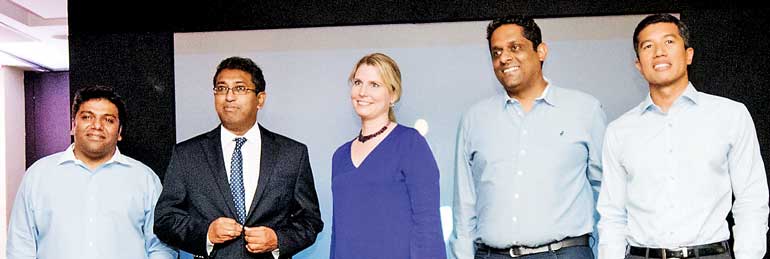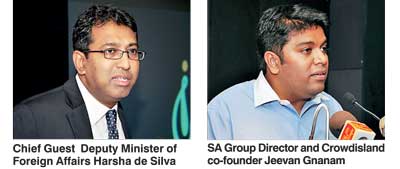Wednesday Feb 18, 2026
Wednesday Feb 18, 2026
Tuesday, 23 February 2016 00:00 - - {{hitsCtrl.values.hits}}

From Left; Jeevan Gnanam - Co-founder Crowdisland, Dr. Harsha De Silva - Deputy Minister of Foreign Affairs of the Government of Sri Lanka, Amy Wilkinson - Lecturer at Stanford Graduate School of Business, Nathan Sivagananathan - Co-founder Crowdisland and Sujendra Mather - Managing Director of York Street Partners at the launch of the Sri Lanka’s first investment crowdfunding platform.
By Shiran Illanperuma
CrowdIsland, Sri Lanka’s first crowdfunding platform – in the vein of Kickstarter and Indiegogo – launched recently with the stated goal of stimulating growth for small and medium sized enterprises and channelling funds into the domestic start-up scene from overseas – especially through the diaspora.
SA Group Director and Crowdisland co-founder Jeevan Gnanam said that the platform would give those outside of Sri Lanka and in  the diaspora a chance to contribute to the economic development of the island in a deep and direct way.
the diaspora a chance to contribute to the economic development of the island in a deep and direct way.
“This platform is all about democratising capital and diminishing risk through transparency and openness. It is symbolic of the new sharing economy,” he said. Gnanam also highlighted the difficulties young entrepreneurs faced when attempting to procure loans from banks for their projects. Without sufficient collateral most were unable to making crowdfunding a more viable option.
Meanwhile Chief Guest at the launch Deputy Minister of Foreign Affairs Harsha de Silva welcomed the launch citing the urgent need for foreign investment to stimulate growth in a lagging economy.
Minister de Silva also pledged to take it upon himself to bring members of the legislature to support crowdfunding platforms.
“The Government’s responsibility is to remove restrictions and to making sure that more people can crowd fund. The current legal system which places restrictions in the number of investors doesn’t make sense now.”
Lecturer at the Stanford Graduate School of Business Amy Wilkinson, who was also present at the event, hailed the launch saying that it would ‘fundamentally change the marketplace’ in Sri Lanka.
Remarking on the strategic advantages of crowdfunding projects Wilkinson said, “If you crowdfund your business people learn about your product before it is out. Therefore you get funding and visibility; so crowdfunding doubles as a marketing strategy.”
Crowdisland will sustain itself by taking 5-6% of money that projects receive.
Pix by Lasantha Kumara